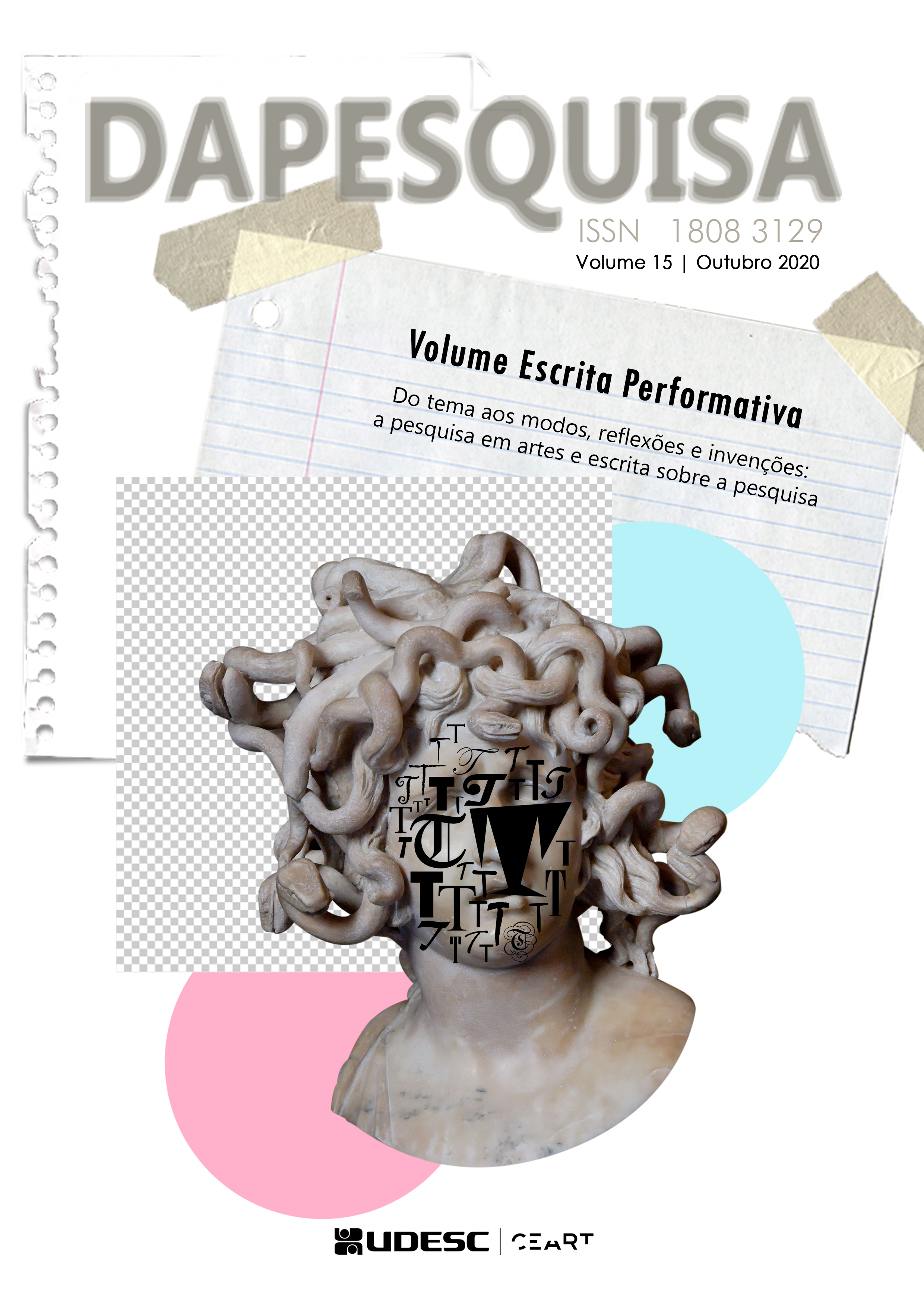Fish caught:
to write the practice, composition processes of performative writing
DOI:
https://doi.org/10.5965/1808312915252020e0020Keywords:
Writing and art, Body language in art, Composition (Art), Performance artAbstract
This article is driven by the question “what are the ways of writing practice?”. From this question we investigate, through a careful listening and a welcoming practice, the notion of fishing as a method itself. Writing the practice as a way of exercising the performativities of the encounters as a creative power: what is written happens in the bodies and, through them, being graphed, materializes themselves - artwork. A process that seeks the horizontality between the bodies and their moving knowledge is presented. Bodies that contain life, and in accepting, refusing and/or pinching the invitation, forms poetic, aesthetic and political networks. Writing as a practice of living bodies, living in the exercise of their possible performativities.
Downloads
References
ALVES, R. Variações sobre o prazer: Santo Agostinho, Nietzsche, Marx e Babette. São Paulo: Editora Planeta do Brasil, 2011.
BARROS, M. O livro das ignorâncias. Rio de Janeiro: Alfaguara, 2016.
BOJUNGA, L. A bolsa amarela. Rio de Janeiro: Editora Objetiva, 2002.
BOURRIAUD, N. Estética relacional. São Paulo: Martins Fontes, 2009.
CLARK, L. Livro-obra. Rio de Janeiro, 1983
DELEUZE, G. Diálogos. São Paulo: Editora Escuta, 1998.
DELEUZE, G. L'abécédaire de Gilles Deleuze. Dir: Pierre-André Boutang, Paris, 1996.
FABIÃO, E. Corpo performativo. In: Bardawil, A. (org.) Tecido afetivo: por uma dramaturgia do encontro. Fortaleza: Cia. da Arte Andanças, 2010, p. 24-26.
FABIÃO, E. Performance e teatro: poéticas e políticas da cena contemporânea. Sala Preta, São Paulo, n. 8, p. 235-246, 2008. Disponível em: http://www.revistas.usp.br/salapreta/article/view/57373/60355. Acesso em 10 ago. 2020.
FABIÃO, E. Programa performativo: o corpo-em-experiência. ILINX-Revista do LUME, Campinas, n. 4, dez. 2013. Disponível em: https://www.cocen.unicamp.br/revistadigital/index.php/lume/article/ view/276. Acesso em: 12 jun. 2013
FABIÃO, E.; LEPECKI, A. (org.). Ações Eleonora Fabião. Rio de Janeiro : Itaú cultural, 2015.
LATOUR, B. Jamais fomos modernos. São Paulo: Editora 34, 1994.
LARROSA, J. Notas sobre a experiência e o saber da experiência. Revista Brasileira de Educação, n. 19, p. 20-28, jan./abr., 2002. Disponível em: https://www.scielo.br/pdf/rbedu/n19/n1 9a02.pdf. Acesso em 10 ago. 2020.
LARROSA, J. Tremores: escritos sobre a experiência. Belo Horizonte: Autêntica Editora, 2014.
LEPECKI, A. Criações e Contextos - Rumos Dança - 2009/2010. [S. l. ] : Itaú Cultural, 2010. Publicado on-line no canal Itaú Cultural. Disponível em: https://issuu.com/itaucultural/docs/rumos_danca_criacoeseconexoes. Acesso em: 05 mar. 2020.
LISPECTOR, C. Água viva. Rio de Janeiro: Rocco, 2008.
MACHADO, A. Proverbios y cantares: XXIX. In: MACHADO, A. Campos de Castilla. [S. l.] : Editorial Literanda, 2012. p .130. Disponível em: encurtador.com.br/fJLMQ. Acesso em: 30 nov. 2017.
MANNING, E.; MASSUMI, B. Thought in the act: Passages in the Ecology of Experience. University of Minnesota Press: Minneapolis, London, 2014.
MORAES, J. G. A poética do convite: abrindo processos de composição coreográfica na improvisação em dança. Dissertação (Mestrado em Artes Cênicas) - Universidade de Brasília, 2019.
PIRES, I. P. Cantos de um educartista: a prática performativa como caminho pedagógico. 2019. Trabalho de Conclusão de Curso (Licenciatura em Artes Cênicas). Universidade de Brasília: Brasília, 2019. Disponível em: https://bdm.unb.br/handle/10483/24587.Acesso em: 10 ago. 2020.
ROLNIK, S. Cartografia Sentimental: transformações contemporâneas do desejo. Porto Alegre: UFGRS Editora, 2016.
WHITEHEAD, A. N. Process and reality: an essay in cosmology. New York: The Free Press, 1927.
ZOURABICHVILI, F. Deleuze: uma filosofia do acontecimento. São Paulo : Editora 34, 2016.
Published
How to Cite
Issue
Section
License
Copyright (c) 2020 Janaína Moraes, Igor Passos Pires

This work is licensed under a Creative Commons Attribution 4.0 International License.
Authors who publish in this journal agree to the following terms:
The authors retain the copyright and grant the journal the right of first publication, with the study being simultaneously licensed under the Creative Commons Attribution-Noncommercial License, which allows the sharing of work with acknowledgment of authorship and initial publication in this journal.
This journal, following the recommendations of the Open Access movement, provides public access to all its content, following the principle that free access to research leads to a greater global exchange of knowledge.
Plagiarism in all its forms constitutes unethical publication behavior and is unacceptable. The Journal DAPesquisa reserves the right to use software or other methods of detecting plagiarism to analyze submitted works.





